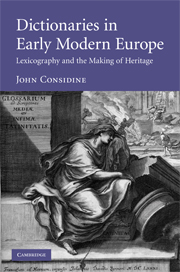Book contents
- Frontmatter
- Dedication
- Contents
- Acknowledgements
- Conventions and abbreviations
- Chapter 1 Introduction
- Chapter 2 The classical heritage I: Philology and lexicography
- Chapter 3 The classical heritage II: Henri Estienne and his world
- Chapter 4 Vernacular heritages I: Germany and the Netherlands 1500–1618
- Chapter 5 Vernacular heritages II: England to circa 1650
- Chapter 6 Vernacular heritages III: England and Scandinavia, circa 1650–1675
- Chapter 7 Post-classical heritages: Du Cange and his world
- Chapter 8 Shared heritages: Polyglot and universal dictionaries
- Conclusion
- Afterword
- Bibliography
- Index
Chapter 3 - The classical heritage II: Henri Estienne and his world
Published online by Cambridge University Press: 22 September 2009
- Frontmatter
- Dedication
- Contents
- Acknowledgements
- Conventions and abbreviations
- Chapter 1 Introduction
- Chapter 2 The classical heritage I: Philology and lexicography
- Chapter 3 The classical heritage II: Henri Estienne and his world
- Chapter 4 Vernacular heritages I: Germany and the Netherlands 1500–1618
- Chapter 5 Vernacular heritages II: England to circa 1650
- Chapter 6 Vernacular heritages III: England and Scandinavia, circa 1650–1675
- Chapter 7 Post-classical heritages: Du Cange and his world
- Chapter 8 Shared heritages: Polyglot and universal dictionaries
- Conclusion
- Afterword
- Bibliography
- Index
Summary
We began to babble in Latin: Henri Estienne and the inheritance of languages
Robert Estienne’s son Henri has been called ‘one of the dominant literary and scholarly figures of the second half of the sixteenth century in Europe … among the greatest French prose writers of the Renaissance … this giant of sixteenth-century scholarship … one of the most fascinating personalities of the Renaissance’. However, the scope and complexity of his achievement have, paradoxically, led to his being generally underappreciated. The most extensive work on him has been done with reference to one part, and not the largest, of his intellectual life, namely his works in French and his discussions of the French language. Beyond that, the best treatments have – unsurprisingly, given his colossal printed output – taken the form of bio-bibliographies, most recently the book quoted above, Fred Schreiber’s The Estiennes, which is the splendid catalogue of a collection of Estienne editions now at the University of North Carolina at Chapel Hill. So, no continuous biography of Estienne has replaced Léon Feugère’s of 1853, and the fullest account of his work in English apart from Schreiber’s is an essay by Mark Pattison which reviews Feugère’s work.
Henri Estienne was born in 1531. By the time of his childhood, the family connection with the business of scholarly printing and publishing was even stronger than it had been at the time of his father’s.
- Type
- Chapter
- Information
- Dictionaries in Early Modern EuropeLexicography and the Making of Heritage, pp. 56 - 100Publisher: Cambridge University PressPrint publication year: 2008



